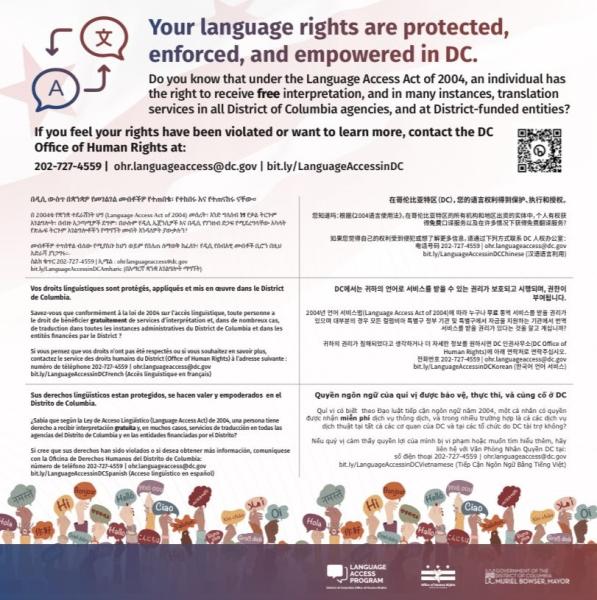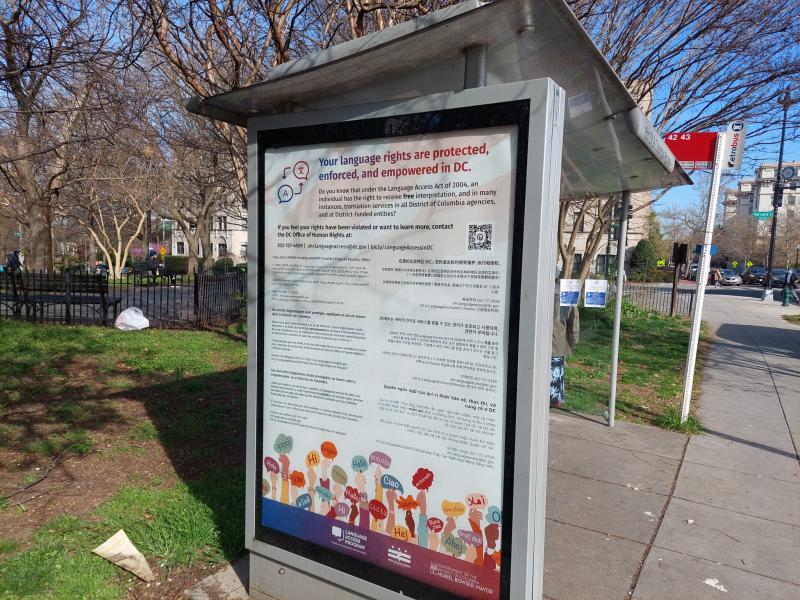Program Description
The Language Access Program is housed under the District of Columbia Office of Human Rights (OHR). It exists to eliminate language-based discrimination, enabling DC residents, workers, and visitors to receive equivalent information and services from the DC government, regardless of what language they speak. The Program’s scope includes all District agencies that come into contact with the public, and it supports these agencies in providing translation and interpretation services for customers who are limited or non-English proficient (LEP/NEP). The Language Access Program organizes its work into four areas: enforcement, compliance monitoring, technical assistance, and community engagement.
- Enforcement: Individuals who believe their language access rights have been violated may file a complaint with OHR. The Program Director personally manages language access complaints and issues written findings after the investigations. The Program Director also works with agencies found in non-compliance to implement corrective actions.
- Compliance Monitoring: While the Program covers all District agencies that engage residents, workers, and visitors, it provides additional support to those agencies with major public contact (see “Laws and regulations” for more information on this distinction). With more potential exposure to the LEP/NEP population, agencies with major public contact have extensive language access responsibilities, which are reflected in the applicable laws and regulations. Program staff hold agencies accountable to these directives by monitoring each agency’s compliance with them. Staff build agency capacity for compliance through the development of attainable two-year action plans known as Biennial Language Access Plans (BLAPs). Agencies report quarterly on their BLAPs’ progress, and Program staff review these reports. Program staff summarize their findings at the end of each fiscal year in the Annual Compliance Report.
- Technical Assistance: Program staff support all District agencies that offer language access services as needed. In addition to responding to individual inquiries from agency members, Program staff regularly provide training on compliance requirements and cultural competency. Staff additionally engage in issue-specific consultations and perform supplemental functions as necessary.
- Community Engagement: To ensure that LEP/NEP residents, workers, and visitors are aware of their language access rights, the Language Access Program conducts outreach in conjunction with community-based organizations that serve immigrant needs. In addition to tabling at events, Program staff regularly deliver “Know Your Rights” trainings. Staff also work closely with members of the DC Language Access Coalition as well as the Consultative Agencies to disseminate information about the Program and create platforms for feedback on the District’s translation and interpretation services. Staff also respond directly to inquiries from members of the public on matters related to language access.
Laws and Regulations
DC’s Language Access Program began with the passage of the Language Access Act of 2004. This Act established the Program at the Office of Human Rights, identified covered entities and enumerated their responsibilities, stipulated requirements for meeting these responsibilities, and outlined mechanisms for compliance monitoring and enforcement. You can view the full text of the Language Access Act of 2004, as updated in 2014, below:
- DC Language Access Act of 2004 (English)
- በቋንቋ አገልግሎት ማግኛ ፕሮግራም ድንጋጌ (Amharic)
- 《哥倫比亞特區語言利用法》(Chinese)
- Loi sur l’accès linguistique de 2004 (French)
- DC 언어 서비스 법 (Korean)
- La Ley de Accesso Linguistico de 2004 (Spanish)
- Luật Tiếp cận Ngôn ngữ của DC (DC Language Access Act of 2004 in Vietnamese)
- Language Access Act Regulations
Engagement and Awareness Campaigns
As part of its mission to eradicate discrimination in the District of Columbia, the Office of Human Rights (OHR) has launched numerous engagement and awareness campaigns aimed at preventing discrimination and encouraging people to report discrimination when it happens. Language access and related issues are featured in several of its campaigns.
Language Access Month Bus Advertisements - In April 2023, OHR wan ads at 9 bus shelters and inside 300 buses. The bus shelters and bus lines are throughout the District, focused in areas heavily populated with Limited-English Proficient and Non-English Proficient (LEP/NEP) communities. The advertisement highlights language access rights in DC and what to do if those rights have been violated. The messages on the ad were translated into the top six non-English languages spoken in DC. Each translated section took the viewer to the Language Access portal on the OHR website, in that respective language.


Your Language Access Rights - In April 2021, OHR's Language Access Program Director Rosa Carrillo and Mayor's Office on Asian and Pacific Islander Affairs (MOAPIA) Executive Director Ben DeGuzman discuss the effects of the Language Access Act since its implementation in 2004. These videos were translated into all six major languages.

DC Websites Speak Your Language Campaign – In September 2014, OHR announced the completion of a yearlong initiative to provide critical service information in multiple languages on over 30 District government agency websites. To promote the new language-specific webpages, OHR placed advertisements in ethnic newspapers and posted them in community centers.

Immigrants Contribute Campaign – Launched in September 2013, this campaign features the stories of immigrants from around the globe. It highlights the contributions of immigrants to the District and discourages discrimination.

Know Your Rights Campaign – The latest wave of this campaign was launched in late August 2012. It aims to raise awareness among limited or non-English proficient residents about requesting an interpreter when accessing District government services and consists of three parts: the (1) "I Speak" cards, a tool to help those with limited or no English to access government services; the (2) television and print advertisements aimed at raising awareness in target communities; and (3) training and outreach to District agencies and direct service providers.

Contact Information
All District agencies, departments, and programs that come into contact with the public must designate at least one employee to manage Language Access matters. For agencies, departments, and programs that fall into the category of “major public contact,” this employee is the Language Access Coordinator (LAC), clicking here to view and download the LAC Directory for FY26 (updated January 12, 2026) for major public contact.
The Language Access Act designates the following agencies as having major public contact:
- Alcoholic Beverage Regulation Administration
- Child and Family Services Agency
- Department of Aging and Community Living
- Department of Behavioral Health
- Department of Buildings
- Department of Corrections Department of Employment Services
- Department of Energy & Environment
- Department of General Services
- Department of Health (DC Health)
- Department of Health Care Finance
- Department of Housing and Community Development
- Department of Human Resources
- Department of Human Services
- Department of Licensing and Consumer Protection
- Department of Motor Vehicles
- Department of Parks and Recreation
- Department of Public Works
- Department of Small and Local Business Development
- Department of Youth Rehabilitation Services
- Department on Disability Services
- District Department of Transportation
- District of Columbia Housing Authority
- District of Columbia Lottery and Charitable Games Control Board
- District of Columbia Office of Zoning
- District of Columbia Public Library
- District of Columbia Public Schools
- Fire and Emergency Medical Services
- Department Homeland Security and Emergency Management Agency
- Metropolitan Police Department
- Office of Administrative Hearings
- Office of the Attorney General – Child Support Services Division
- Office of Contracting and Procurement
- Office of Human Rights
- Office of Planning
- Office of Tax and Revenue
- Office of the People’s Counsel
- Office of the State Superintendent of Education
- Office of the Tenant Advocate
- Office of Unified Communications
This webpage was last updated on January 26, 2026.


